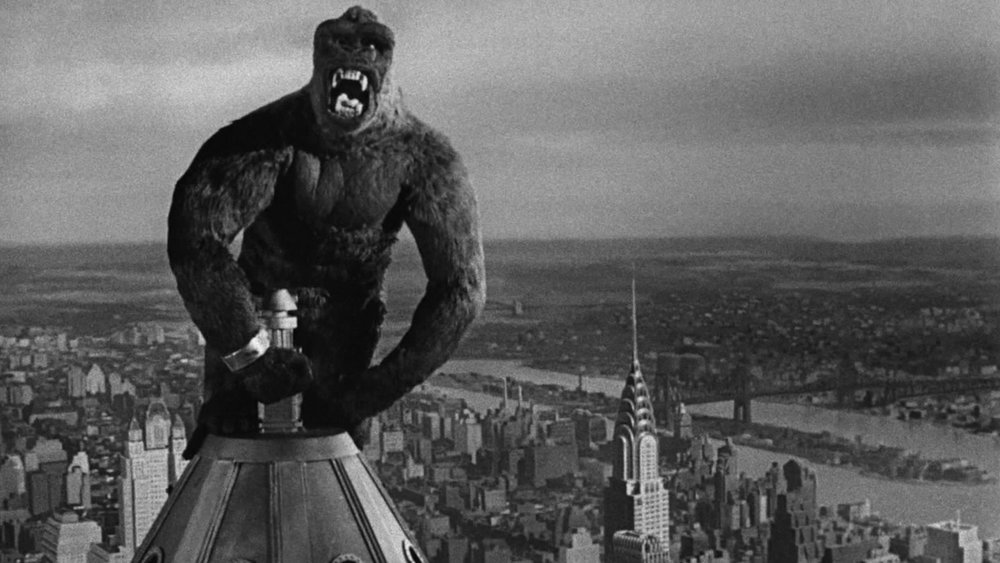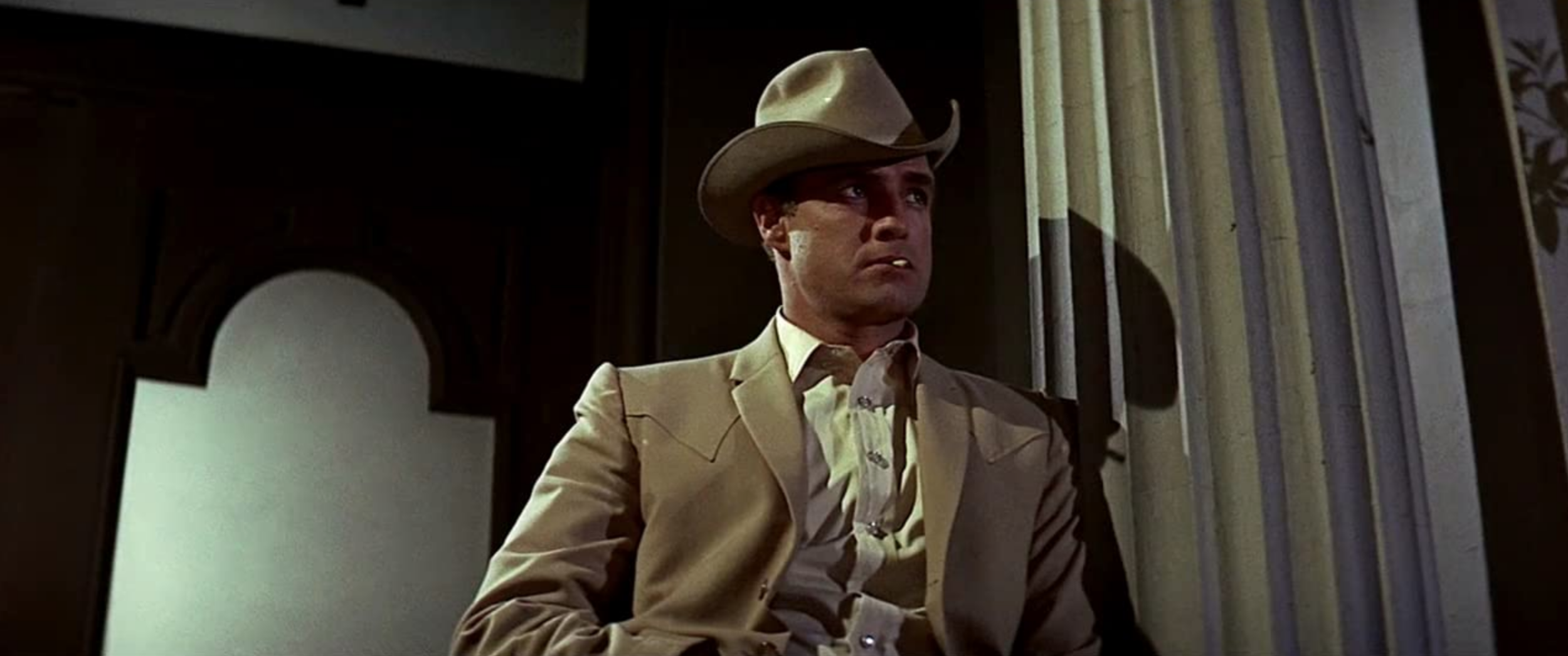"Now Listen to Me..."
Happy New Year Everyone! (Hopefully a celebratory scene like this will be possible in the not too distant future).
Just some thoughts on current happenings:
Our monthly feature of “Classic Film Screenings from around the world” remains suspended as there are no reliable reports of noteworthy classical film theatrical screenings during the Corona virus pandemic.
There are 20 recommended films to watch on Turner Classic Movies in the U.S. this month:
My first TCM recommendation is star Jimmy Cagney's most formidable foray into noir, White Heat. A criminal's mother-fixated pathology and the undercover cop trying to catch him are the topics of this previous recommendation here. TCM's screen will heat up Tuesday, January 5 at 11 pm PST.
The screen will heat up again big time when Fritz Lang's The Big Heat, previously recommended here, arrives Saturday, January 9 at 9 am PST.
Next on my list of films to watch is King Kong (1933), who's scheduled to make his grand entrance on Saturday, January 9 at 3 pm PST. I have reviewed this motion picture with a focus on its musical score here.
1967's Hotel was taken, like 1970's Airport, from a novel by Arthur Hailey and is the far better crafted of the two films. This proficient and underrated motion picture was previously reviewed here. Hotel will open its doors Monday, January 11 at 7:30 am PST.
Later this same afternoon, TCM is featuring another film starring Rod Taylor well worth seeing and interestingly enough, directed by the aforementioned Airport’s director George Seaton: 36 Hours, previously reviewed here. The hour to watch will occur Monday, January 11 at 1:15 pm PST.
The next recommendation is Citizen Kane.
This is one of our Top Ten films of all time. Any serious student of the humanities cannot see this cinematic spectacle enough. Citizen Kane contains an enormous wealth of profound thought on human relations, not to mention a dazzling display of innovative storytelling techniques without peer. Ultimately, it’s that magical synchronicity of character and plot development that places it rightfully alongside art’s highest achievements. This American motion picture masterpiece is scheduled to show on TCM Tuesday, January 12 at 11:15 am PST.
Immediately following Citizen Kane, is that film’s editor Robert Wise’s turn in the director’s chair: 1949’s knockout noir The Set-Up, previously reviewed here and happening again on TCM Tuesday, January 12 at 1:30 pm PST.
Perfectly appropriate for the romantically inclined is The Ghost and Mrs. Muir. This film’s sublime depiction of supernatural romance is enhanced by the intelligence and maturity of the artists who guide us through a profound exploration of love's true nature and spiritual acceptance. It has previously been recommended here. The romance will commence Tuesday, January 12 at 10:15 pm PST.
This hypnotic but terrifying entrancement is a highly expressionistic Grimm-like fable, that appears as if conveyed from a child's point of view. "Fairytale noir" is what Film Noir expert Eddie Muller calls it, previously reviewed in Opening Up a Treasure: The Night of the Hunter and will be told Wednesday January 13 at 10:30 am PST and again Saturday, January 23 at 7 pm PST.
My next TCM recommendation comes with a caveat: If you haven't as yet seen this film, please do so *before* reading my review. Doctor Zhivago is the latest in a series of Top Ten “All that Glitters…”: The Overrated and will be shown on TCM Thursday, January 14 at 9:15 am PST.
Then there's John Ford's masterpiece The Searchers, previously reviewed here. It is Top Ten Western #2 and is as likely as any film to provide one with a truly unforgettable, rich and rewarding movie watching experience. The search will begin Saturday, January 16 at 5 pm PST.
The unmissable Busby Berkeley extravaganza Footlight Parade is also a previous TCM recommendation here. Let the show begin Sunday, January 17 at (early morning) 3 am PST.
For those who enjoy the best in creative romantic comedy, be sure to tune in for Pillow Talk (reviewed here) Sunday, January 17 at 10:30 am PST.
Next is a film noir bonafide classic The Narrow Margin, a previous TCM recommendation here. This little firecracker is set to explode Friday, January 22 at (early morning) 3 am PST.
Director Michael Curtiz brings inspirationally to life the unsuspectedly stylish film noir The Unsuspected, previously reviewed here, Friday, January 22 at 8 am PST.
Later today, TCM is showing one of film noir's greatest treats: Tension, the commonality with The Unsuspected being the presence of noir queen Audrey Totter. This is also a prior TCM recommendation here and can be felt Friday, January 22 at 1:45 pm PST.
Next is Top Ten Western #6 Howard Hawks' 1948 Red River reviewed here. This is one acutely observed, character-driven western you don't want to miss. The drive will begin on TCM Saturday, January 23 at 2:30 pm PST.
Following Red River (a Top Ten western) is Out of the Past, one of film noir's finest and most highly recommended here. She will arrive Saturday, January 23 at 5 pm PST.
Another prior TCM recommendation is Robert Siodmak's expert 1949 film Criss Cross with Burt Lancaster and Yvonne De Carlo imbuing their characters with passion and complex individuality.
Criss Cross was previously reviewed here. It will cast its noirish spell on TCM Monday, January 25 at 5 pm PST.
My final TCM and January’s Blu-ray recommendation (reviewed below) is 1966's The Chase happening (updated) Wednesday, April 3 (2024) at 10:45 pm PDT.
TCM's current monthly schedule can be confirmed by clicking on any of the above TCM related images. For those who live in parts of the U.S. other than the western region, the time zone can be adjusted in the upper right-hand corner of TCM's programme.
My Soundtrack recommendation for the month of January is composer Jerry Goldsmith’s pulsating score to 1982’s cinematic powerhouse First Blood.
First Blood's greatest strength is in establishing the main conflict notably its mature and thoughtful presentation: a soldier outcast, his last friend gone (done in, no less, by the U.S. introduced toxic chemical Agent Orange), being harassed, bullied and then assaulted by an overzealous small town authority drunk with power. Most of the credit goes to Canadian director Ted Kotcheff’s observational, non-preachy temperament. Late in the game, however, Sylvester Stallone (the co-writer) politicises the central conflict with what the Vietnam vets including his character went through during and after the war which up to that point Rambo was silent about. His speech, badly written as it is (e.g. “… but somebody wouldn’t let us win”) detracts from the central confrontation, clashes with his character's resilient and unassuming nature and, worst of all, severely mars the story's integrity and enveloping qualities. Stallone went much, much further in that politicised direction with the sequels making First Blood by far the best of the lot, ironic since this is the actor's favourite of the series as well.
Masterfully enriching this film’s aforementioned excellence is Jerry Goldsmith’s perfectly attuned score: one that effectively underlines both the actions and character motivations behind them. Intrada has released this 2-CD world premiere of the complete (from multi-track masters) soundtrack. More information including ordering can be obtained by clicking on the accompanying image.
A Happy Birthday shout-out to actress Jessica Walter, who turns 80 on January 31st.
She is most universally recognised for her vigorous portrayal of Clint Eastwood’s psycho stalker in the actor’s directorial debut Play Misty for Me (1971). Jessica also made notable appearances in Lilith (1964), The Group (1966), Grand Prix (1966, for director John Frankenheimer), Bye Bye Braverman (1968, also for The Group’s director Sidney Lumet) and The Flamingo Kid (1984). TV viewers will most likely remember her role as Lucille Bluth on the sitcom Arrested Development (2003 - 2019) and for providing the voice of Malory Archer on the FX animated series Archer (2009 - 2020).
This month's Blu-ray selection is The Chase (1966).
"Shoot a man for sleeping with someone's wife? That's silly. Half the town'd be wiped out."
Stories that take place in the American South that dwell on their characters’ steamy sensations, especially those involving sexual indiscretions or infidelity, tend to come across as more artificially embellished than if the setting lies elsewhere. Subtlety has a tendency to disappear in the South. Many of Tennessee Williams’ plays testify to this, a type of cause and effect most evident in the film Reflections in a Golden Eye as well. Perhaps it’s the hot, sultry atmosphere, slow languorous attitude of its inhabitants or their southern drawl that gives the proceedings a sense of hormonal overload. And so it goes with The Chase, when far too many of a small Texas town’s idiosyncratic citizens become consumed in one way or another by the possibility of an escaped convict’s return home.
Robert Redford
The more enthralling films that take place in the South, such as Intruder in the Dust, The Night of the Hunter and Moonrise, either focus on important narrative occurrences that the primary characters revolve around or make the setting itself the subject that shapes its residents’ lives e.g. The Last Picture Show. In The Chase, the central figures’ concern of heightened unease remains too speculative in nature and therefore fails to fully tether to what should be the story's focus: how a wrongfully perceived threat can lead to mob violence.
Angie Dickinson, Marlon Brando
Aside from the flamboyantly soapy, side-exposition on display, the film’s dramatic effectiveness is further shackled by the casting of Robert Redford in the pivotal role of Bubber Reeves, the prisoner on the run. In such life-and-death, tension-filled situations as The Chase provides, the boyish Redford, at this stage in his career, required multi-dimensional characters with a strong identifiable purpose to perform… traits severely lacking here. Lots of interactions with other more skilled thespians were necessary. Perhaps some facial hair or a set of partially concealed skills lends mystery to his roles (he scores a triple play in 1969’s Butch Cassidy and the Sundance Kid) and help offset his distracting good looks (one might wonder if a guy who looks like that could have any real problems) and often bland portrayals. Besides, we realise fairly early on, only to be reminded later, that Redford’s Reeves poses no danger to anyone.
Janice Rule, Robert Duvall
Marlon Brando
On the opposite side of the spectrum we have Marlon Brando as the town sheriff keeping it all together both as an actor and in the part he’s playing. Each one of Brando’s encounters with the various townsfolk are magnetic although, unlike Redford, this actor communicates a wealth of complex thought and emotion even on his own. He’s not just Sheriff Calder in this film, he always has been. Jane Fonda and Angie Dickinson augment the male stars most capably.
Jane Fonda
There are, in addition, a bevy of fine actors in supporting roles any cinema buff will marvel at. Setting aside their characters’ more libidinous complications, one will find a kindling of tension, fear and hate fuelled by an angry few who will ignite Bubber’s arrival into a raging inferno of mass terror and vigilantism. This drama’s incendiary culmination, so effectively realised by director Arthur Penn in keeping with John Barry’s bullseye guided score, charges The Chase with its most visceral and compelling moments not to mention being highly precedent for our times. Lillian Hellman adapted Horton Foote’s play. Sam Spiegel produced.
(From left) Marlon Brando, Robert Redford
The Chase is available from Twilight Time in a Region Free limited edition (only 3,000 units produced) and can be ordered from Screen Archives Entertainment by clicking on the accompanying image.
A.G.





























